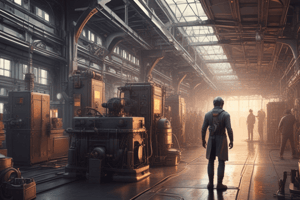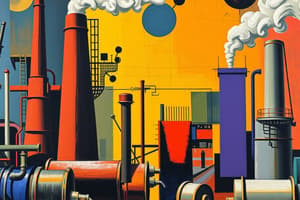Podcast
Questions and Answers
In order to stop the spread of industrial technology, Britain:
In order to stop the spread of industrial technology, Britain:
forbade mechanics, engineers, and others from leaving the country.
Which country showed the greatest percentage increase in world manufacturing from 1870 to 1913?
Which country showed the greatest percentage increase in world manufacturing from 1870 to 1913?
the United States
The assembly line was perfected by:
The assembly line was perfected by:
HENRY FORD
The most important result of the Second Industrial Revolution was:
The most important result of the Second Industrial Revolution was:
Which authors were known for their critical writing about the excesses and problems resulting from industrialization?
Which authors were known for their critical writing about the excesses and problems resulting from industrialization?
At the end of the 1800s, the direct effect of more leisure time was that:
At the end of the 1800s, the direct effect of more leisure time was that:
After Germany's unification in 1871, industrialization accelerated and:
After Germany's unification in 1871, industrialization accelerated and:
Which country was the first to industrialize on the continent of Europe?
Which country was the first to industrialize on the continent of Europe?
The author who described the problems of industrialized England was:
The author who described the problems of industrialized England was:
What is Andrew Carnegie most well known for?
What is Andrew Carnegie most well known for?
Flashcards are hidden until you start studying
Study Notes
Industrial Revolution Key Points
- Britain took measures to prevent the outbound movement of industrial knowledge by forbidding mechanics and engineers from leaving the country.
- The United States experienced the most significant percentage increase in global manufacturing from 1870 to 1913.
- Henry Ford was instrumental in perfecting the assembly line technique, revolutionizing manufacturing efficiency.
- The Second Industrial Revolution resulted in the United States emerging as a dominant world economic power.
- Authors Charles Dickens and Mark Twain critically addressed the negative effects and challenges brought about by industrialization in their works.
Cultural Impact
- The expansion of leisure time at the end of the 1800s led to the development and growth of popular culture.
Global Industrialization Trends
- Following the unification of Germany in 1871, there was a rapid acceleration in industrialization, marked by the construction of extensive railroad networks.
- Belgium was the pioneer of industrialization on the European continent, setting a precedent for other nations.
Notable Figures
- Charles Dickens portrayed the harsh realities faced by industrialized England through his literature.
- Andrew Carnegie is recognized for founding one of the largest and most powerful companies in the world during his time, contributing significantly to the steel industry.
Studying That Suits You
Use AI to generate personalized quizzes and flashcards to suit your learning preferences.




